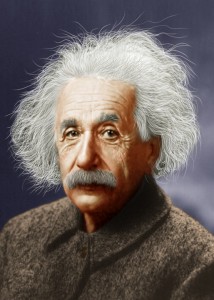Main Body
The Many Faces of Genius
Click play on the following audio player to listen along as you read this section.

Is intelligence something that is measured by success in school? Not always. In 1895, Albert Einstein wrote an exam to get into university. He failed all the non-science parts of the test. Yet Einstein went on to become one of the world’s best-known geniuses. Winston Churchill struggled in school and failed sixth grade. He went on to win a Nobel Prize and be elected prime minister of the United Kingdom twice. Whoopi Goldberg struggled to read and write and eventually dropped out of high school. She went on to win every major award for excellence in show business: the Oscar, Emmy, Tony, and Grammy.

These stories show us that intelligence is more complex than something that can be measured by schoolwork and tests. In fact, intelligence is so complex that scientists cannot even agree on how to define it. Some people think of intelligence as the ability to solve problems, learn new things, or adapt to new situations. Others think of intelligence as the ability to cope in the world.
Being intelligent is often seen as the same as being good at reading, writing, and math. These are the subjects that schools tend to focus on. But people can be intelligent in a variety of different ways. For example, people can be:
- Picture smart: able to visualize, read maps, and draw
- Word smart: able to read, write, tell stories, and explain things
- Logic smart: able to solve puzzles, work with shapes, see patterns, or figure out machines like computers
- Body smart: able to dance, act, play sports, or work with their hands
- Music smart: able to pick up a tune or rhythm, sing, play an instrument, or compose music
- People smart: able to get along with people, understand how others are feeling, or give good advice
- Self smart: able to sort out their feelings, know their strengths and weaknesses, or make personal decisions
- Nature smart: able to understand the natural world and their role in it
To learn more about what you are good at, try out the quiz at http://www.literacynet.org/mi/assessment/findyourstrengths.html. This website will also give you ideas for using your strengths to improve your reading and writing skills.
Attributions
Albert Einstein
Albert Einstein-Colorized by DonkeyHotey is used under a CC BY 2.0 license.
Whoopi Goldberg
Whoopi by Archman8 is used under a CC BY SA 2.0 license.

